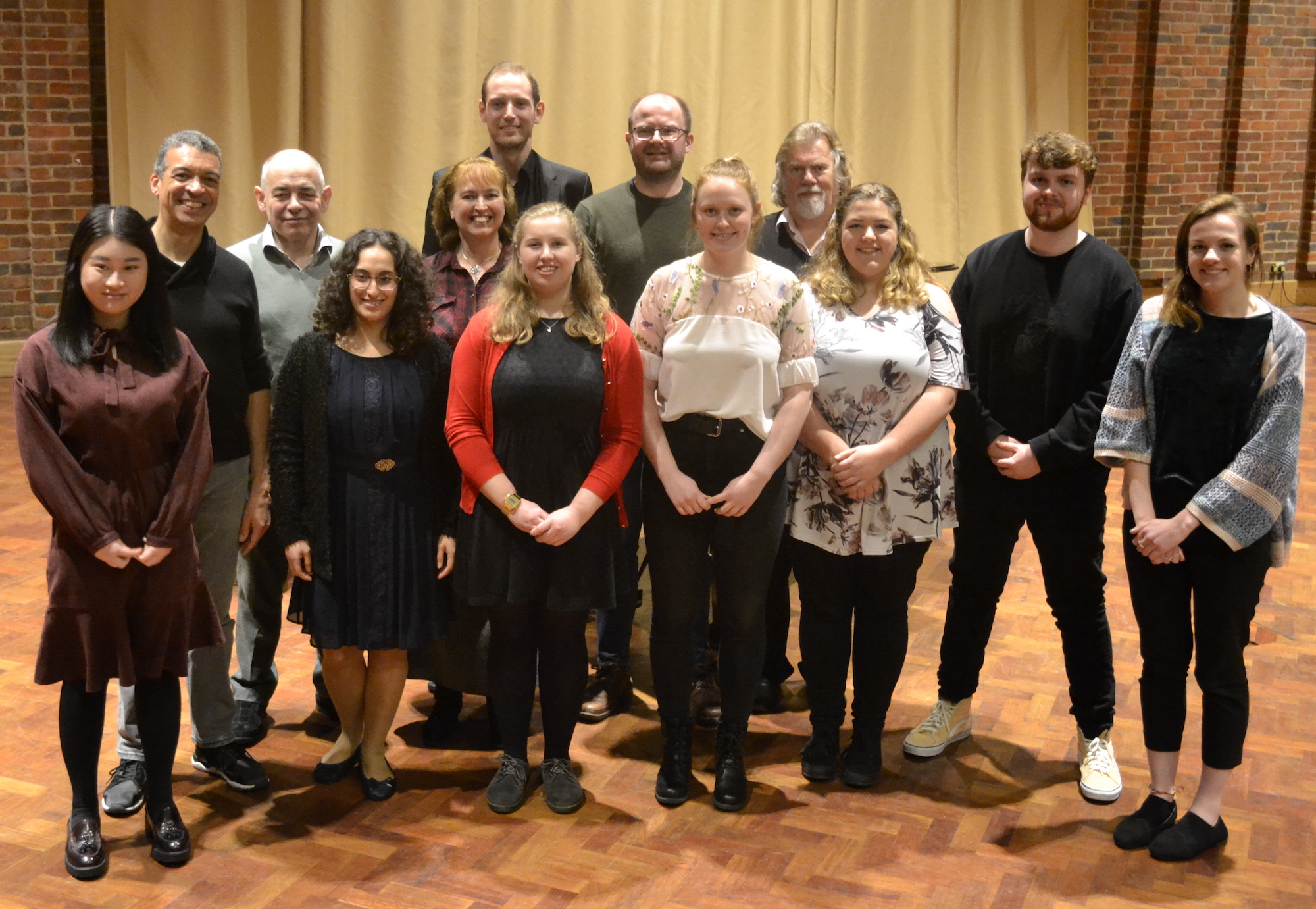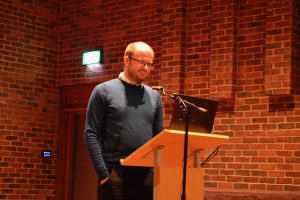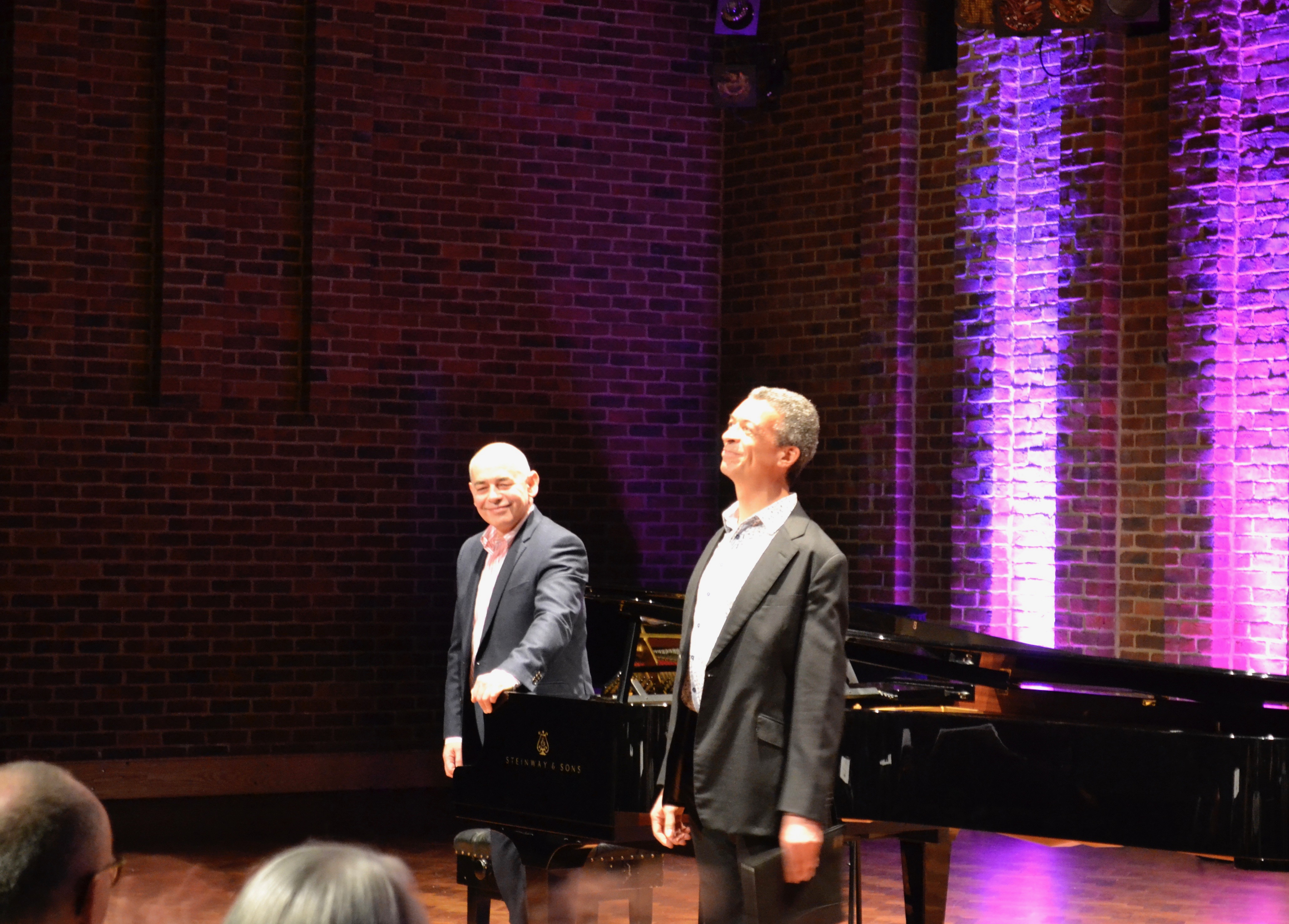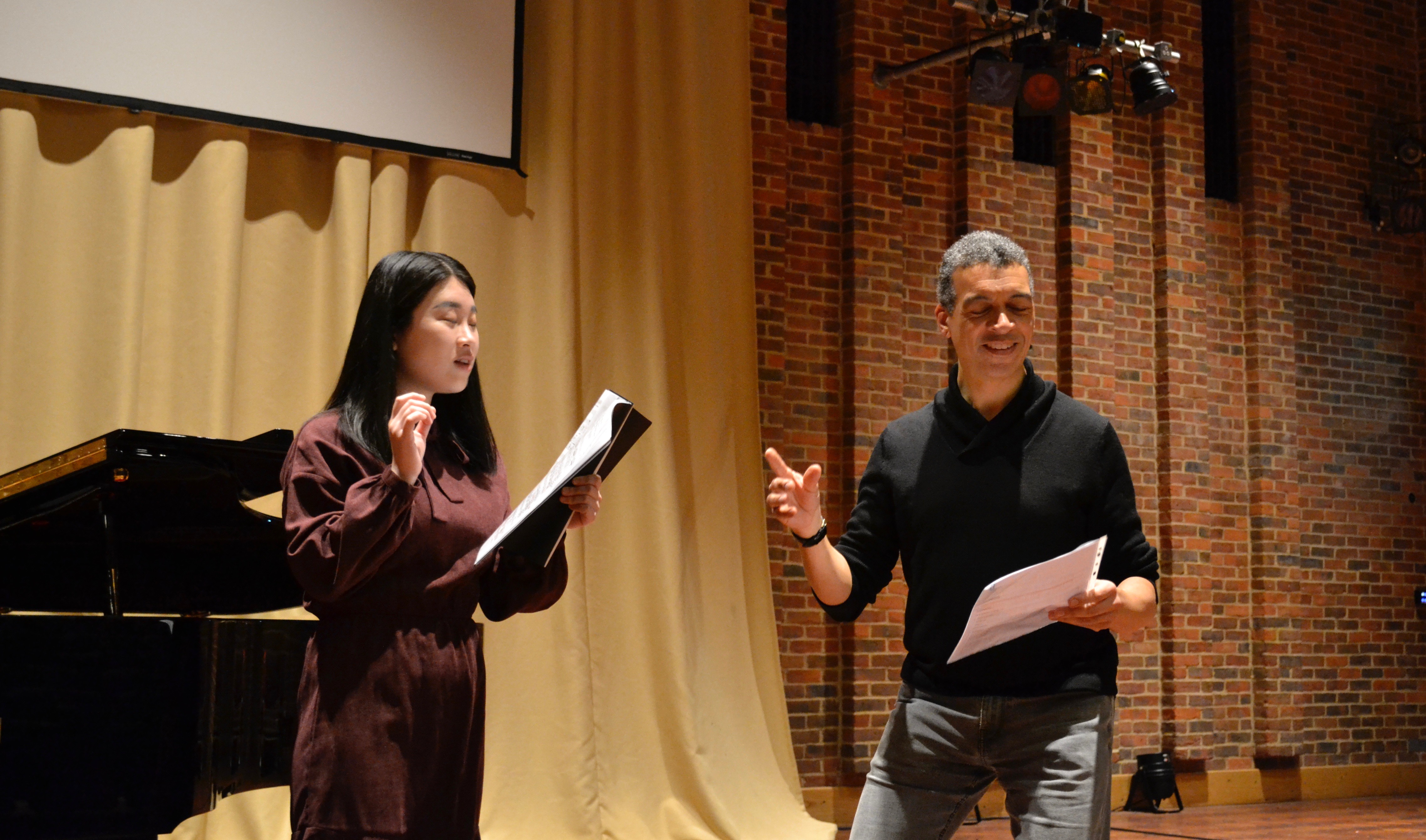Schubert, Singing and Sexuality

Music’s Dr David Bretherton was the mastermind behind last week’s Schubert concert and masterclass – participants heard fabulous music, explored issues around composers’ sexuality, and watched our students learn from international artists:
During LGBT History Month 2019, the Department of Music and Turner Sims Concert Hall held two Schubert events connected to my Arts and Humanities Research Council (AHRC) Leadership Fellowship on queer music theory. On Thursday 21st February, Turner Sims held a recital of Schubert’s songs by world-renowned artists Roderick Williams (baritone) and Iain Burnside (piano); I gave a pre-concert talk on the debate about Schubert’s sexuality. Then, on Friday 22nd, Roderick and Iain gave a Schubert song masterclass for students at the Department of Music and beyond.
 Schubert has featured prominently in my research for this AHRC fellowship over the last year, partly because I’ve always loved his music, but also because in the late 1980s and early 1990s he was at the centre of what was the first major controversy of an emergent ‘queer musicology’. As I outlined in my talk, music biographer Maynard Solomon had argued that Schubert and his friends could well have been homosexual, and then musicologist Susan McClary furthered this idea by suggesting that Schubert’s ‘homosexuality’ might have influenced his music. An often-ill-tempered debate ensued: several scholars strongly objected to Solomon’s and McClary’s suggestions on reasonable grounds, but the contributions of some commentators had a whiff of homophobia about them. Musicological debates rarely arouse as much passion and attract as much interest as this one did – it was even reported in the New York Times! Reading the acrimonious exchanges while I was an undergraduate student left a strong impression on me, although I never imagined that I’d be returning to the issue some two decades later. Considering how a composer’s sexuality may or may not relate to their music is now at the centre of my current research, but I’m generally less concerned about whether or not a composer was ‘gay’, and much more interested in the nature of the arguments that are presented on all sides. I’m especially interested in the role played by prejudice and bias, whether conscious or unconscious, so I was delighted to be able to hold these events and to talk about my research as part of the University’s programme of activities to mark LGBT History Month 2019.
Schubert has featured prominently in my research for this AHRC fellowship over the last year, partly because I’ve always loved his music, but also because in the late 1980s and early 1990s he was at the centre of what was the first major controversy of an emergent ‘queer musicology’. As I outlined in my talk, music biographer Maynard Solomon had argued that Schubert and his friends could well have been homosexual, and then musicologist Susan McClary furthered this idea by suggesting that Schubert’s ‘homosexuality’ might have influenced his music. An often-ill-tempered debate ensued: several scholars strongly objected to Solomon’s and McClary’s suggestions on reasonable grounds, but the contributions of some commentators had a whiff of homophobia about them. Musicological debates rarely arouse as much passion and attract as much interest as this one did – it was even reported in the New York Times! Reading the acrimonious exchanges while I was an undergraduate student left a strong impression on me, although I never imagined that I’d be returning to the issue some two decades later. Considering how a composer’s sexuality may or may not relate to their music is now at the centre of my current research, but I’m generally less concerned about whether or not a composer was ‘gay’, and much more interested in the nature of the arguments that are presented on all sides. I’m especially interested in the role played by prejudice and bias, whether conscious or unconscious, so I was delighted to be able to hold these events and to talk about my research as part of the University’s programme of activities to mark LGBT History Month 2019.
 Roderick Williams has sung for the Turner Sims audience before (he contributed to a wonderful concert of songs by Hugo Wolf in 2016), and it was a pleasure to see him return to sing Schubert, now with OBE in hand. This time he was accompanied by pianist and Radio 3 personality Iain Burnside. (I’ve known Iain for many years. As he reminded me after the concert, he was on the panel when I auditioned – successfully 🙂 – for the Guildhall School of Music and Drama 23 years ago…). The centrepiece of their programme was Schubert’s posthumously published song-cycle Schwanengesang (‘Swan-song’, D. 957), which was interspersed with a number of lesser-known works, including gems such as ‘Die Liebe hat gelogen’ (‘Love has lied’, D. 751) ‘Totengräbers Heimweh’ (‘Gravedigger’s longing’, D. 842). The recital was captivating, but equally fascinating was hearing Roderick and Iain reveal ‘tricks of the trade’ to vocal students during the masterclass the following morning. Until this point, I hadn’t fully appreciated just how important acting and eye contact are for singers, even when performing non-operatic works, and neither had I appreciated how much of the sense of a song’s words can be portrayed through facial expressions and vocal intonation. (Some of the participants also quickly learnt how crucial it is to know what the song you’re singing is about and the importance of researching and developing the background of the character you’re portraying!) The vocal students participating in the masterclass did very well, and were also very brave – there was a large audience, and for a few of the students this was the largest that they had sung a solo in front of to date. It was remarkable to see how quickly they took on board the comments of the two ‘masters’, Roderick and Iain, and it was lovely to hear them improve before our very ears.
Roderick Williams has sung for the Turner Sims audience before (he contributed to a wonderful concert of songs by Hugo Wolf in 2016), and it was a pleasure to see him return to sing Schubert, now with OBE in hand. This time he was accompanied by pianist and Radio 3 personality Iain Burnside. (I’ve known Iain for many years. As he reminded me after the concert, he was on the panel when I auditioned – successfully 🙂 – for the Guildhall School of Music and Drama 23 years ago…). The centrepiece of their programme was Schubert’s posthumously published song-cycle Schwanengesang (‘Swan-song’, D. 957), which was interspersed with a number of lesser-known works, including gems such as ‘Die Liebe hat gelogen’ (‘Love has lied’, D. 751) ‘Totengräbers Heimweh’ (‘Gravedigger’s longing’, D. 842). The recital was captivating, but equally fascinating was hearing Roderick and Iain reveal ‘tricks of the trade’ to vocal students during the masterclass the following morning. Until this point, I hadn’t fully appreciated just how important acting and eye contact are for singers, even when performing non-operatic works, and neither had I appreciated how much of the sense of a song’s words can be portrayed through facial expressions and vocal intonation. (Some of the participants also quickly learnt how crucial it is to know what the song you’re singing is about and the importance of researching and developing the background of the character you’re portraying!) The vocal students participating in the masterclass did very well, and were also very brave – there was a large audience, and for a few of the students this was the largest that they had sung a solo in front of to date. It was remarkable to see how quickly they took on board the comments of the two ‘masters’, Roderick and Iain, and it was lovely to hear them improve before our very ears.
 The masterclass participants from the University of Southampton were Geoffrey Horton, Suzie Kitto, Hannah Murray, Alice Paine, Finley South-Klein, Izzy Tuffin-Donnevert and Yuxi Zeng, who were all accompanied at the piano by Karen Kingsley. They were joined by Alexander Fritz (baritone) and Achinoam Keisar (piano) from the Guildhall School of Music and Drama. My thanks go to Roderick, Iain, and all the participants, as well as to Kevin Appleby and the team at Turner Sims, and Louise Johnson and David Owen Norris in the Department of Music. And finally, a great big ‘thank you’ to Amy Williamson for all her help with the organisation and administration for these events.
The masterclass participants from the University of Southampton were Geoffrey Horton, Suzie Kitto, Hannah Murray, Alice Paine, Finley South-Klein, Izzy Tuffin-Donnevert and Yuxi Zeng, who were all accompanied at the piano by Karen Kingsley. They were joined by Alexander Fritz (baritone) and Achinoam Keisar (piano) from the Guildhall School of Music and Drama. My thanks go to Roderick, Iain, and all the participants, as well as to Kevin Appleby and the team at Turner Sims, and Louise Johnson and David Owen Norris in the Department of Music. And finally, a great big ‘thank you’ to Amy Williamson for all her help with the organisation and administration for these events.
With the Department of Music’s and Turner Sims’s support, I am intending to organise similar events in February 2020. I very much hope that together we will be able to regularly mark LGBT History Month with music from this point forward.


